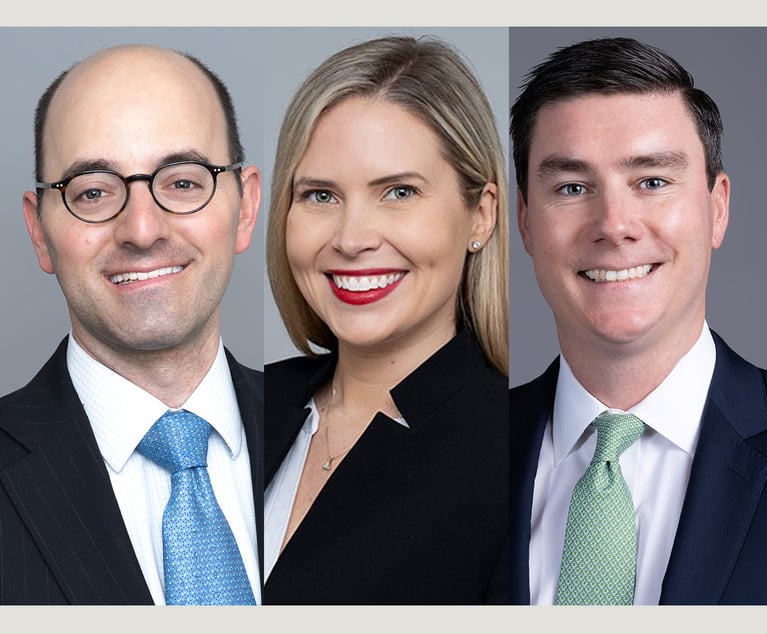The Problems With Mail-In and Digital Ballots Are Similar to E-Discovery
In this month's column, I will try to look closely at that process and the arguments in favor and against it, to see how some of the issues involved in the disputes are the same as those involving e-discovery.
December 23, 2020 at 01:43 PM
10 minute read
 Leonard Deutchman
Leonard Deutchman As I am sure that pretty much everyone is aware, a remarkable amount of political and legal wrangling followed the recent presidential election. Prior to the 2020 election, many states passed laws or simply set out procedures allowing voters to vote by mailing in or physically delivering ballots prior to Election Day. The reason for these laws was to minimize the negative results of having an election in the midst of the coronavirus pandemic. The pandemic has spread as individuals have passed the virus, causing an increasing number of persons to become infected. Antiviral drugs and emergency-use vaccines are about to be released in the second week of December and into January 2021, which means that they would be released several weeks after Election Day. Because the virus is spread from person to person through breathing, persons talking to each other, persons touching objects that have been touched (i.e., infected) by others, and so on, there was a great concern that the gathering of persons at voting booths could easily lead to a large increase in the number of persons infected with the coronavirus. To avoid such an outcome, mail-in ballots were authorized in numerous states so that voters could vote without leaving their homes and risking catching the virus from those outside their home.
Legal challenges to the use of mail-in ballots have been rejected. The U.S. Supreme Court denied injunctive relief in a lawsuit filed by Republican U.S. Rep. Mike Kelly of Pennsylvania, which sought to prevent the election from being certified as well as to invalidate all of the mail-in ballots cast in Pennsylvania. As well, the court, voting 7-2, denied Texas' motion to file a complaint that the key battleground states of Pennsylvania, Wisconsin, Michigan and Georgia violated the Constitution's elector's clause and the 14th Amendment when they made changes to some of their election rules in response to the pandemic.
This content has been archived. It is available through our partners, LexisNexis® and Bloomberg Law.
To view this content, please continue to their sites.
Not a Lexis Subscriber?
Subscribe Now
Not a Bloomberg Law Subscriber?
Subscribe Now
NOT FOR REPRINT
© 2025 ALM Global, LLC, All Rights Reserved. Request academic re-use from www.copyright.com. All other uses, submit a request to [email protected]. For more information visit Asset & Logo Licensing.
You Might Like
View All
Patent Pending ... and Pending ... and Pending? Brace Yourself for Longer Waits
3 minute read

How Some Elite Law Firms Are Growing Equity Partner Ranks Faster Than Others
4 minute readTrending Stories
Who Got The Work
J. Brugh Lower of Gibbons has entered an appearance for industrial equipment supplier Devco Corporation in a pending trademark infringement lawsuit. The suit, accusing the defendant of selling knock-off Graco products, was filed Dec. 18 in New Jersey District Court by Rivkin Radler on behalf of Graco Inc. and Graco Minnesota. The case, assigned to U.S. District Judge Zahid N. Quraishi, is 3:24-cv-11294, Graco Inc. et al v. Devco Corporation.
Who Got The Work
Rebecca Maller-Stein and Kent A. Yalowitz of Arnold & Porter Kaye Scholer have entered their appearances for Hanaco Venture Capital and its executives, Lior Prosor and David Frankel, in a pending securities lawsuit. The action, filed on Dec. 24 in New York Southern District Court by Zell, Aron & Co. on behalf of Goldeneye Advisors, accuses the defendants of negligently and fraudulently managing the plaintiff's $1 million investment. The case, assigned to U.S. District Judge Vernon S. Broderick, is 1:24-cv-09918, Goldeneye Advisors, LLC v. Hanaco Venture Capital, Ltd. et al.
Who Got The Work
Attorneys from A&O Shearman has stepped in as defense counsel for Toronto-Dominion Bank and other defendants in a pending securities class action. The suit, filed Dec. 11 in New York Southern District Court by Bleichmar Fonti & Auld, accuses the defendants of concealing the bank's 'pervasive' deficiencies in regards to its compliance with the Bank Secrecy Act and the quality of its anti-money laundering controls. The case, assigned to U.S. District Judge Arun Subramanian, is 1:24-cv-09445, Gonzalez v. The Toronto-Dominion Bank et al.
Who Got The Work
Crown Castle International, a Pennsylvania company providing shared communications infrastructure, has turned to Luke D. Wolf of Gordon Rees Scully Mansukhani to fend off a pending breach-of-contract lawsuit. The court action, filed Nov. 25 in Michigan Eastern District Court by Hooper Hathaway PC on behalf of The Town Residences LLC, accuses Crown Castle of failing to transfer approximately $30,000 in utility payments from T-Mobile in breach of a roof-top lease and assignment agreement. The case, assigned to U.S. District Judge Susan K. Declercq, is 2:24-cv-13131, The Town Residences LLC v. T-Mobile US, Inc. et al.
Who Got The Work
Wilfred P. Coronato and Daniel M. Schwartz of McCarter & English have stepped in as defense counsel to Electrolux Home Products Inc. in a pending product liability lawsuit. The court action, filed Nov. 26 in New York Eastern District Court by Poulos Lopiccolo PC and Nagel Rice LLP on behalf of David Stern, alleges that the defendant's refrigerators’ drawers and shelving repeatedly break and fall apart within months after purchase. The case, assigned to U.S. District Judge Joan M. Azrack, is 2:24-cv-08204, Stern v. Electrolux Home Products, Inc.
Featured Firms
Law Offices of Gary Martin Hays & Associates, P.C.
(470) 294-1674
Law Offices of Mark E. Salomone
(857) 444-6468
Smith & Hassler
(713) 739-1250






